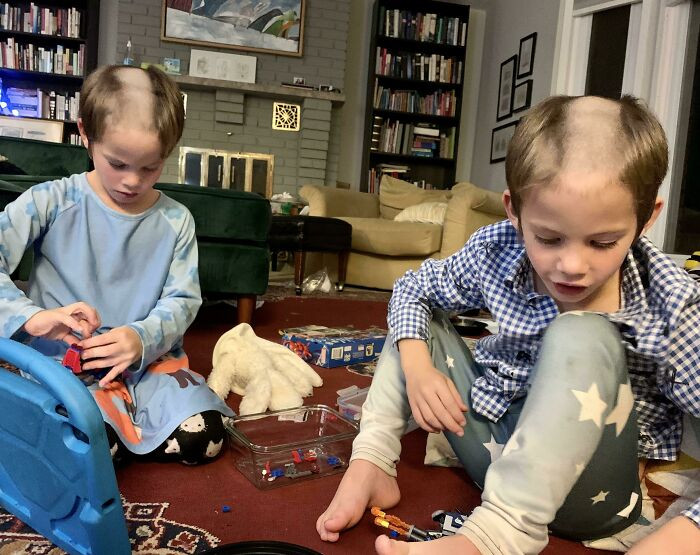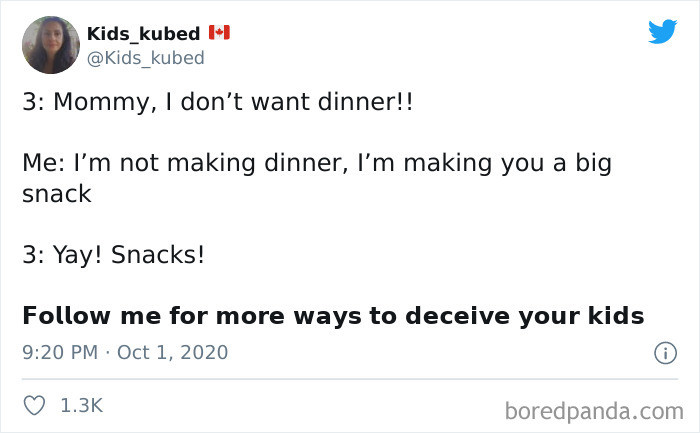50 Stupid Things Kids Did That Adults Believe Are Too Cute Not To Share
Kids are awesome. They are goofy, silly, cute, and totally clueless about the world they live in. And because they are so eager to get to know it, they get the most wonderful ideas. They are never bored, and they don’t let anyone around them get bored. Oh, how much we all miss that time.
That’s why adults love to share stupid things they did as kids or see other kids do, and they are all hilarious. And they bring on some nostalgic feelings. We have compiled a list of the best ones, and we know you are going to like them.
1. "My Sister Drew On Her Passport"
 LuisSweden
LuisSweden2. "My Little Brother's Search History. Lots Of Diarrhea And Vomit Followed"
 SentientFecalMatter
SentientFecalMatter3. Faster is slower
 Smyley12345
Smyley123454. "Identically Unperturbed By What They Did To Themselves With The Clippers At 5am"
 passingglans
passingglans5. Snacks!
 Kids_kubed
Kids_kubed6. Not so smart
 ponettplus
ponettplus7. "My 1.5-Year-Old Daughter, Ladies And Gentlemen"
 sabby55
sabby558. Same thing
 WonderMonkey78
WonderMonkey78To understand how children think and come up with the most unbelievable things we as grownups would never think of, we have to look at the world from a child's perspective. And it is entirely different than ours.
One of the guiding forces in a kid's development is inquisitiveness, making them want to discover and try out new things and learn.
Brenna Hassinger-Das, a psychology assistant professor at Pace University, New York, explained that kids' job is "to play and learn." But adults should also try to dedicate time to be curious and playful.
"Research suggests that it relates to satisfaction, happiness, empathy, and problem-solving skills," Hassinger-Das said and added, "we are always in need of refining the ways in which we view the world."
9. Together
 Luciuxness
Luciuxness
10. Hair transplant
 jamessmurray
jamessmurray
11. I love you
 emmaaraphael
emmaaraphael
“Parents can nurture curiosity in a lot of different ways. For instance, encouraging children to take part in free or unstructured play allows them to figure out how things work and develop their own storylines and directions for their play.”
The professor emphasized that it’s important to “encourage children to ask questions (and then answer them in a developmentally appropriate way) and to let children follow their interests. If your child loves animals, go for a nature walk where you live (whether in a city or a more rural area) and point out all the animals you see. You could also read books about the animals they like and perhaps venture out a bit further for a hike.”
Encouraging curiosity early can help a child develop a habit that will continue into adulthood. “We know that curiosity is still important for learning and overall life satisfaction,” the professor concluded.
12. "A Friend On FB Just Posted This"
 natisnotcool
natisnotcool
13. "My Son Found Sea Shells On His First Trip To The Beach. I Didn't Have The Heart To Tell Him"
 ShadyDingo
ShadyDingo
14. Turning into a bird
 cassietotallyjust
cassietotallyjust
15. Weird math
 oumahgad
oumahgad
16. "My Nephew Got A Card From His Teacher And Was Stoked. He Read It, Then Instead Of Showing Anybody, He Sat Pensively On The Couch For A While. Finally A Quiet Voice Asked “Auntie, How Long Have I Had Autism?”
 extidedetergentfan
extidedetergentfan
17. Lost
 Sky_Crescent
Sky_Crescent
18. "My Little Brother Grabbing Live Wasps Because "It's Fun""
 Nixoli100
Nixoli100
19. So, it doesn’t matter if you win or lose…
 frogitivity
frogitivity
20. "Mom Told Her Daughter To Grab Her Mask So They Can Go To The Store. This Was The Mask She Grabbed"
 jorhey14
jorhey14
21. "My Kid Won't Eat Her Eggs Because They Have "Dark Spots". Yeah, That's The Fork"
 thisissixsyllables
thisissixsyllables
22. "That Time I Figured Out How To Take The Lid Off Of The Vent, And Proceeded To Get Stuck In It"
 yatenate
yatenate
23. IF!
 TomerUllman
TomerUllman
24. "Winnie The Poo"
 cactusqueen94
cactusqueen94
25. Cheater
 DJLevela
DJLevela
26. "How My Dad Tricked Me Into Eating My Crust"
 SageAnowon
SageAnowon
27. That explains a lot
 rururu38
rururu38
28. That was close
 AngryManTV
AngryManTV
29. Kids learn fast...
 loghan10
loghan10
30. Better late then never
 thebigfigdig
thebigfigdig
31. No one told them
 HenpeckedHal
HenpeckedHal
32. "My Niece’s Hiding Spot"
 secret_agent_dog
secret_agent_dog
33. "My Son Asked Me Why This Lady Is Reading Poop Magazine. I'm So Proud"

34. "When The Photographer Says “Touch Your Cheeks Together”
 DooDooPapa
DooDooPapa
35. "When I Was 2 I Thought An Electrical Box Was A Robot. My Mom Let Me Take A Picture With It, And I Have Come Across That Picture Again"
 Atrylno
Atrylno
36. "He Wants To Get On The Bus, And The Bus On The TV"
 claire_adlam
claire_adlam
37. It could happen to anyone
 JelloBodega
JelloBodega
38. is dangerous
 pkmnTrainer_axl
pkmnTrainer_axl
39. Jail time avoided
 NonSonoTommyy
NonSonoTommyy
40. Left-handed
 jazz_inmypants
jazz_inmypants
41. Nephew Figured Out I’m Still A “Kid”"
 frannyfranfran5
frannyfranfran5
42. "Kids In Rome Were Mischievous Too. Toddler's Footprint In A 2000 Year Old Clay Tile"
 OptimoPrincipi
OptimoPrincipi
43. Murderer
 mirielmargaret
mirielmargaret
44. "My 7-Year-Old Son Was Excited To Show Off His Clay Pirate Boat"
 TheDiscordium
TheDiscordium
45. So clever
 Crew_Joey16
Crew_Joey16
46. "Got New Doors Installed. He Doesn't Realise One Of His Favorite Hide And Seek Spots Has Been Severely Compromised"
 stepuptoredalert
stepuptoredalert
47. No difference
 Enkaybee
Enkaybee
48. Better safe than sorry
 hankgreen
hankgreen
49. "Someone's Kid Hung Up The Wet Wipes To Allow Them To Dry"
 thinkingbell955
thinkingbell955
50. "My 3-Year-Old, Everybody"
 wutwut191
wutwut191




